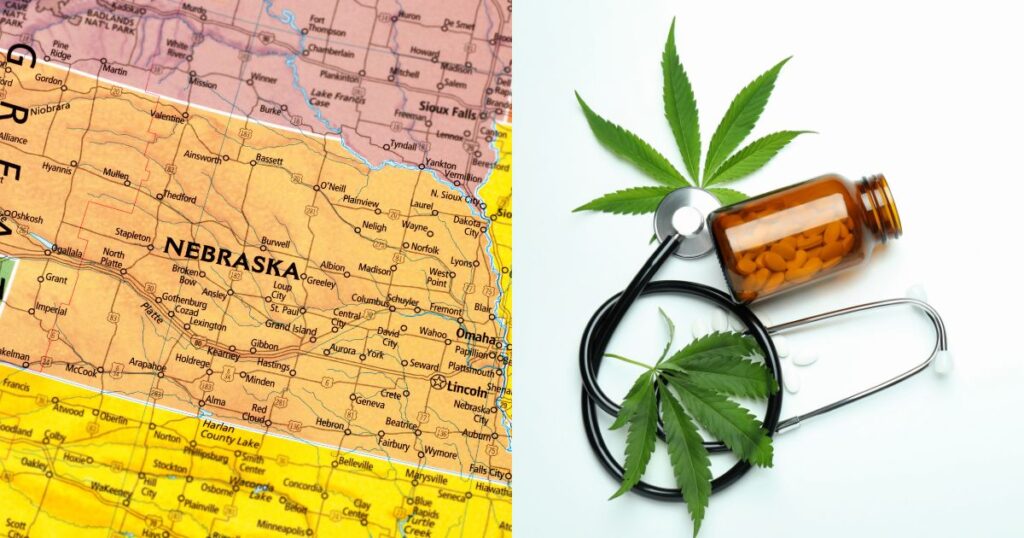Nebraska is on the verge of a significant shift in its cannabis policy. Following overwhelming voter approval, the state has begun the complex process of establishing a medical marijuana program.
The Nebraska Medical Cannabis Commission recently took a step forward to that goal by offering the first two cultivator licenses, marking a big moment for patients and advocates who have long pushed for access to medical cannabis in Nebraska.
These developments are unfolding amidst legal questions and a separate, yet related, plan by the Omaha Tribe of Nebraska to open a recreational dispensary.
The First Medical Marijuana Licenses Issued in Nebraska
After voters in 2024 overwhelmingly approved measures to legalize medical cannabis and create a regulatory system, the Nebraska Medical Cannabis Commission took on the task of bringing the program to life. On October 7, 2025, the commission officially offered the first two of a possible four cultivator licenses as first reported by the Nebraska Examiner.
The Nebraska Medical Cannabis Commission offered the first licenses to Nancy Laughlin-Wagner of Omaha, representing Midwest Cultivators Group LLC, and Patrick Thomas of Raymond. The commission selected these applicants from a pool of 39, evaluating their applications first based on a random lottery system.
To be approved, applicants needed to achieve an average score of over 70 on a 100-point scale devised by the commission. Thomas received an average score of 73.33, and Laughlin-Wagner received a score of 72 via data provided by the Examiner.
The commission also denied two other applications that did not meet the 70-point threshold. One of the denied applicants was Crista Eggers, executive director of Nebraskans for Medical Marijuana, the advocacy group that led the successful 2024 ballot initiatives.
Eggers’ application received a wide range of scores from the three evaluators—11, 44, and 72—leading to an average of 42.33. The specifics of the scoring rubric have not been made public, prompting calls for more transparency from advocates like Eggers.
These licensing decisions represent a critical, albeit contentious, step forward. Licensed cultivators will be permitted to grow no more than 1,250 flowering plants at one time. The commission will address licenses for transporters, manufacturers, and dispensaries at a later date.
This gradual rollout is happening under the shadow of potential legal challenges, including from the Nebraska Attorney General’s Office, which has continuously challenged the commission’s authority to issue licenses under federal law.
The Omaha Tribe’s Cannabis Initiative
While the state navigates the complexities of its medical program, the Omaha Tribe of Nebraska is moving forward with its own cannabis plans on sovereign land. In July 2025, the tribe legalized cannabis for both recreational and medical use within its territory. Now, tribal officials are moving quickly to establish a dispensary, with a target opening date in early 2026, according to Nebraska Public Media.
John Cartier, the attorney general for the Omaha Tribe, has outlined a clear path forward. The first major step is creating a five-person tribal cannabis commission, composed of three tribal members and two non-tribal members with significant industry experience. According to Cartier, there has been substantial interest, with over 70 people applying for these positions.
Once the commission is in place, it will begin the licensing process. Initially, the tribe will focus on a single vertical license. This license will allow the tribe, potentially in a joint venture with a partner, to control the entire process from cultivation and testing to transportation and sales.
This approach is designed to ensure the program is well-regulated and meets its goals. Cartier also mentioned the possibility of licensing smaller grow operations for tribal members in the future.
The motivation behind the tribe’s initiative is twofold. It represents an exercise of tribal sovereignty, allowing the tribe to set its own policies. It also presents a crucial economic opportunity. With anticipated cuts to federal funding for programs across Indian country, the revenue generated from cannabis sales could provide a vital new income stream and create much-needed jobs for the community.
Cartier noted he has had productive conversations with Nebraska’s Attorney General, Mike Hilgers, to ensure clear communication as the tribe’s program moves forward.
What’s Next for Cannabis in Nebraska?
The parallel developments in Nebraska highlight a complex and evolving legal environment for cannabis. The state is methodically building its medical program, with the first cultivators now licensed to begin operations.
However, regulatory hurdles and potential legal opposition complicate the path, which could impact the timeline for when patients. The commission’s emergency regulations, which currently prohibit smokable flower and edibles, are also a point of contention among advocates who argue they contradict the voters’ intent.
Simultaneously, the Omaha Tribe is asserting its sovereignty to create a different model—one that includes recreational access. Their progress toward opening a dispensary by 2026 could establish the first legal recreational cannabis sales within Nebraska’s borders, albeit on tribal land.
For Nebraskans, these two paths signal a new era. The introduction of state-licensed medical cannabis and a tribal-run recreational market will undoubtedly reshape public access, economic activity, and the legal landscape for years to come.
















